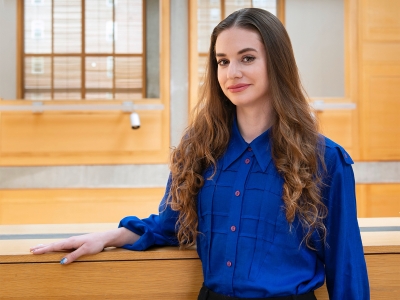It is with great sadness that the School of Journalism and Communication shares the news of the sudden passing of Dr. Ebere Ahanihu, a scholar deeply committed to addressing the inequalities that are embedded in education, digital technology, and development policies. An alumnus of the School and a former instructor in the Institute of African Studies, Dr. Ahanihu completed a Master’s of Journalism and Ph.D. in Communication at Carleton’s School of Journalism and Communication, and was an unwavering advocate for post-development approaches to education, journalism, and digital platforms.
His professors, classmates and friends mourn the sudden loss of a dignified, gentle man, whose stern demeanour was always transformed by his smile and a peel of laughter. His sudden death cuts short a career of promising scholarship.
Dr. Ahanihu’s dissertation, “Digitizing Failure: Power and Development in Nigerian e-Schools,” was a multi-methodological and ethnographic study of the adoption of commercial edu-tech models in Nigerian schools, a clear-eyed assessment of the intersections of race, capitalism, and big tech that underpinned corporate efforts to modernize and monetize children’s learning. His research documented the empty promises of development officials and the immoral business models of power brokers in the computational industries. Yet, Dr. Ahanihu’s research also centered the experiences and lived struggles of teachers, students, and their families, and illustrated the capacity of African-centered approaches to transform our collective future.
Professor Josh Greenberg, Director of the School of Journalism and Communication, remembers meeting with Ebere soon after he returned from a research trip to Nigeria in November 2014. “Ebola was still hanging over Ebere’s home country like a dark cloud, and the political situation in Ekiti State, where he spent several months doing fieldwork, created even more significant challenges for him,” Greenberg recalls.
“Ebere worked incredibly hard under enormously difficult political and emotional circumstances. Yet, he pushed and pushed and persevered. I’ll never forget how proud he was at having overcome these challenges, first in his fieldwork and then in writing and eventually defending his dissertation.”
Dr. Ahanihu’s scholarship was distinguished by the tenacity and situational intelligence that was characteristic of his work in journalism, a profession he valued highly. An award-winning journalist who often took on the big questions of his time, Dr. Ahanihu brought the strengths of reporting and scholarship together in a unique way, often blending dogged determination and scholarly patience with spectacular results.
Professor Allan Thompson, head of the Journalism program at Carleton and Associate Director of the School of Journalism and Communication, was the Graduate Supervisor when Ebere first contacted Carleton in 2008 about joining the Master of Journalism program.
“Ebere was at the top of his craft after 18 years in journalism when he was forced to flee Nigeria,’’ Thompson said. “His application to join our Master of Journalism program made clear he wanted to right some of the wrongs that had forced him to uproot himself and start his life over again in Canada.
“The strength of character that it had taken for Ebere to make that difficult choice to flee his homeland emerged again and again as he worked to find his place in Canada, to bring his family here to join him and to just keep going to complete his studies,” Thompson said.
Dr. Ghadah Alrasheed, who met Ebere when they commenced PhD study in 2010, recalls “his perseverance and determination, kindness to his colleagues, honesty, and love and devotion for his family and children,” and how his “conversations inside and outside the class have had a lasting impact on my thoughts about many things”.
Professor Nduka Otiono recalls their similar beginnings in a newsroom at Rutam House in Lagos, the location of Nigeria’s flagship newspaper, The Guardian, and Ebere’s determination to become a scholar and settle his family in Ottawa, noting that, “Ebere worked very hard as an immigrant to Canada to achieve a decent livelihood for himself and his young family…. They truly deserve our support at this most difficult time.”
Ebere never smiled more brightly, Professor Chris Russill recalls, than when discussing his daughter’s studies at Carleton. “We shared laughter about many things over the years, but never so much when discussing whether he might finish his degree before Ngozi completed her BA.”
“The thing that always stayed with me,” said Russill, who served as Ebere’s dissertation supervisor, “was his determination and commitment to a better world for himself and his family, but also for Nigerians, Africans, and Canadians too. He saw all of us as interconnected to an extraordinary degree. I believe his scholarship, journalism, and love for those around him flowed from this determination and informed his belief that technology is meaningless if it doesn’t allow a sense of our shared humanity.”
Dr. Ahanihu was very proud to have Ngozi and his wife, Bisi, settle with him in Ottawa, and of Nneka, Obbina, and his many grandchildren.
A GoFundMe campaign to support the family in their time of need has been set up by Robert Peck, a former Canadian ambassador who served in Lagos and became familiar with Ebere’s story.
Tuesday, February 16, 2021 in Communication News, Journalism News, News
Share: Twitter, Facebook



